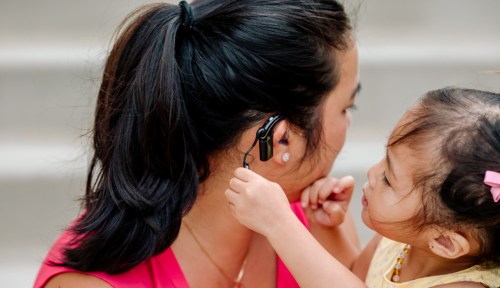This fall, the U.S. Food and Drug Administration approved certain hearing aid models for purchase over the counter (OTC)—a historic change for the millions of Americans who experience some form of hearing loss. The OTC hearing aids you can now buy at your local pharmacy use the same technology as certain prescription aids and are meant for adults 18 years and older who have mild to moderate hearing impairment. Though, OTC hearing aids typically have fewer features than prescription ones and offer no customizations. (Just FYI, any hearing aids that do not fall within those parameters, such as those meant for moderate to severe hearing loss or those for children, will still require a prescription.) In practice, this means you can walk in and buy a hearing aid without having to go through a medical exam, get a prescription, or have a professional fitting, according to the National Council on Aging.
Experts in This Article
This change makes hearing aids affordable and accessible for people who may not be able to see a hearing specialist or healthcare provider on a regular basis. While there are some drawbacks, experts largely say this is a good thing—and it’s been a long time coming. In 2017, Congress passed bipartisan legislation requiring the FDA to create a category of OTC hearing aids, but it wasn’t fully implemented until now. “It took several years for the FDA to approve and for devices to be manufactured for this new category or hearing aids,” says Robin Carson, AuD, audiologist expert for Eosera, a company that specializes in ear-care products.
This opens the door for many people to get the care they need for hearing loss. “OTC hearing aids are a way for more people to affordably access hearing healthcare,” says Amy Sarrow, AuD, CCC-A, doctor of audiology and Michigan-based audiologist. “In the U.S., over 40 million Americans have hearing loss, and less than 30 percent have pursued treatment. We know that hearing loss is one of the leading modifiable risk factors for cognitive decline, and untreated hearing loss is associated with reduced quality of life, mental health, and even financial health.”
“OTC hearing aids are a way for more people to affordably access hearing healthcare.”—Amy Sarrow, AuD, CCC-A, doctor of audiology and Michigan-based audiologist
Why access to OTC hearing aids is so important
Cost and stigma are the two biggest barriers to access for those who need hearing aids, says Dr. Sarrow. It’s no secret that prescription hearing aids come with a hefty price tag—they typically range from $2,000 to $6,000, and insurance plans are often reluctant to cover them. There’s also the time commitment, as shuttling back and forth to doctor’s appointments for fittings can be difficult for many people. Again, OTC hearing aids aren’t exactly the same as prescription ones, but they are changing the game when it comes to cost—they’re typically thousands of dollars less than their prescription counterparts, according to the National Council on Aging. Some OTC hearing aids cost as little as $100 to $300, which has the potential to bridge this hearing health gap for so many Americans facing economic hardships.
“The FDA’s approval of OTC hearing aids is a significant way to help reduce cost for those who have mild to moderate hearing loss, have normal ear canal anatomy, and can manage technology with some independence,” says Dr. Sarrow. Widening access will hopefully spur more people to seek treatment, which will likely lessen the stigma over time, too, she says.
What to know about using OTC hearing aids
Just because you can buy OTC hearing aids at the pharmacy now, doesn’t mean they’re right for everyone. “While people with mild to moderate hearing loss might be excellent candidates, anything more severe should be treated by a professional,” says Dr. Carson. In a perfect world, you’d find a provider to do routine follow-up care and monitor your hearing annually, she says. That’s because untreated hearing loss can have significant health implications, such as cognitive decline, social isolation, and fatigue, “which can be avoided or improved when devices are fit properly, using best practices from a professional hearing healthcare provider,” she says.
While it’s not always possible, talking with a trusted provider about your hearing concerns first—and having a hearing test—could help guide you in deciding whether OTC hearing aids are a good option for you. Getting the proper fit, making sure the features match up with your particular hearing issues, and knowing how to care for your hearing aids, OTC or otherwise, will help you get the best possible results for years to come.
Sign Up for Our Daily Newsletter
Get all the latest in wellness, trends, food, fitness, beauty, and more delivered right to your inbox.
Got it, you've been added to our email list.











